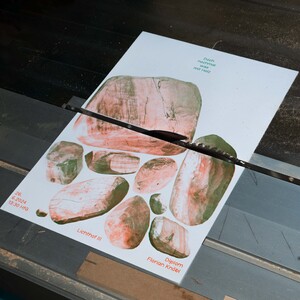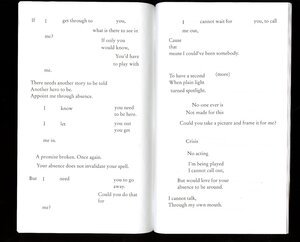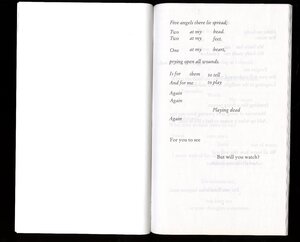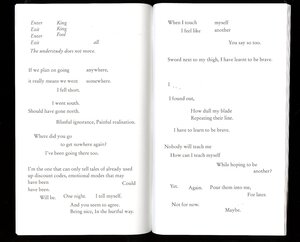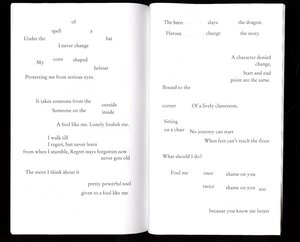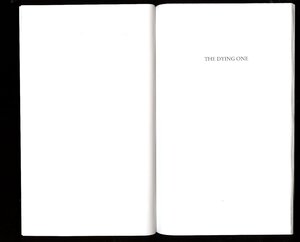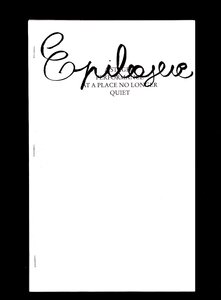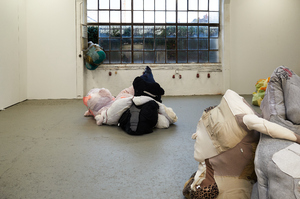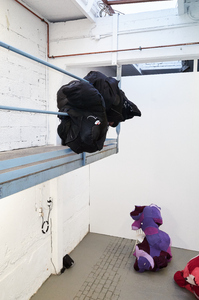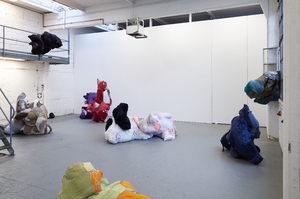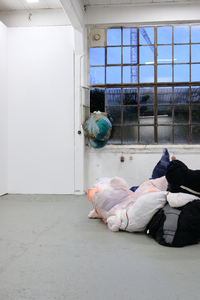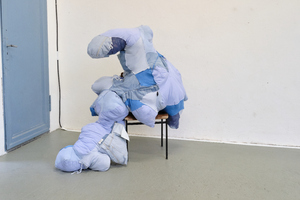Johanna Schäfer
| Name | Johanna Schäfer |
36 Inhalte
- Seite 1 von 3
Plakat
- Titel
- Plakat
- Autor/in
- Kategorie
- Schlagworte
- Material
- Ort: Institution
- Ort
- Lichthof 3
- Stadt
- Land
- Beteiligte Institution(en)
- Titel
- Plakat
- Urheberrechtshinweis
- © Florian Knöbl
- Rechtsschutz/Lizenz
- Freigabe Nutzung HfG
- Medienersteller/in
- Beziehung/Funktion
- Projektleiter/in
- Semester
- Studiengang
- Typ der Abschlussarbeit
- Importiert am
- 20.10.2024
- Übergeordnete Sets
- 1
Epilogue to a staged performance at a place no longer quiet_06
- Titel
- Epilogue to a staged performance at a place no longer quiet_06
- Untertitel
- Publikation zur Ausstellung "a staged performance at a place no longer quiet"
- Autor/in
- Beschreibung (en)
- The publication to my exhibition serves not as an explanation but as an extension of my shown work. Printed on old paper stock and staple bound the publication recalls the revealing of the structural elements of narration and immersion in my exhibition. The texts are extended fragments of the animated characters' monologues.
- Kategorie
- Typ des Projekts/Werks
- Mitwirkende
- Abmessungen
- 18,5 x 30cm
- Ort: Institution
- Stadt
- Land
- Titel
- Epilogue to a staged performance at a place no longer quiet_06
- Urheberrechtshinweis
- © Jonathan Blaschke
- Rechtsschutz/Lizenz
- Medienersteller/in
- Beziehung/Funktion
- Medien-Beschreibung
- Die Publikation zu meiner Ausstellung dient nicht als Erklärung, sondern als Erweiterung meiner gezeigten Arbeit. Gedruckt auf altem Papier und mit Klammerheftung erinnert die Publikation an die Offenlegung der Strukturelemente der Narration und Immersion in meiner Ausstellung. Die Texte sind erweiterte Fragmente der Monologe der animierten Figuren.
- Medien-Beschreibung (en)
- The publication to my exhibition serves not as an explanation but as an extension of my shown work. Printed on old paper stock and staple bound the publication recalls the revealing of the structural elements of narration and immersion in my exhibition. The texts are extended fragments of the animated characters' monologues.
- Semester
- Studiengang
- Typ der Abschlussarbeit
- Importiert am
- 16.02.2024
- Übergeordnete Sets
- 1
Epilogue to a staged performance at a place no longer quiet_05
- Titel
- Epilogue to a staged performance at a place no longer quiet_05
- Untertitel
- Publikation zur Ausstellung "a staged performance at a place no longer quiet"
- Autor/in
- Beschreibung (en)
- The publication to my exhibition serves not as an explanation but as an extension of my shown work. Printed on old paper stock and staple bound the publication recalls the revealing of the structural elements of narration and immersion in my exhibition. The texts are extended fragments of the animated characters' monologues.
- Kategorie
- Typ des Projekts/Werks
- Mitwirkende
- Abmessungen
- 18,5 x 30cm
- Ort: Institution
- Stadt
- Land
- Titel
- Epilogue to a staged performance at a place no longer quiet_05
- Urheberrechtshinweis
- © Jonathan Blaschke
- Rechtsschutz/Lizenz
- Medienersteller/in
- Beziehung/Funktion
- Medien-Beschreibung
- Die Publikation zu meiner Ausstellung dient nicht als Erklärung, sondern als Erweiterung meiner gezeigten Arbeit. Gedruckt auf altem Papier und mit Klammerheftung erinnert die Publikation an die Offenlegung der Strukturelemente der Narration und Immersion in meiner Ausstellung. Die Texte sind erweiterte Fragmente der Monologe der animierten Figuren.
- Medien-Beschreibung (en)
- The publication to my exhibition serves not as an explanation but as an extension of my shown work. Printed on old paper stock and staple bound the publication recalls the revealing of the structural elements of narration and immersion in my exhibition. The texts are extended fragments of the animated characters' monologues.
- Semester
- Studiengang
- Typ der Abschlussarbeit
- Importiert am
- 16.02.2024
- Übergeordnete Sets
- 1
Epilogue to a staged performance at a place no longer quiet_04
- Titel
- Epilogue to a staged performance at a place no longer quiet_04
- Untertitel
- Publikation zur Ausstellung "a staged performance at a place no longer quiet"
- Autor/in
- Beschreibung (en)
- The publication to my exhibition serves not as an explanation but as an extension of my shown work. Printed on old paper stock and staple bound the publication recalls the revealing of the structural elements of narration and immersion in my exhibition. The texts are extended fragments of the animated characters' monologues.
- Kategorie
- Typ des Projekts/Werks
- Mitwirkende
- Abmessungen
- 18,5 x 30cm
- Ort: Institution
- Stadt
- Land
- Titel
- Epilogue to a staged performance at a place no longer quiet_04
- Urheberrechtshinweis
- © Jonathan Blaschke
- Rechtsschutz/Lizenz
- Medienersteller/in
- Beziehung/Funktion
- Medien-Beschreibung
- Die Publikation zu meiner Ausstellung dient nicht als Erklärung, sondern als Erweiterung meiner gezeigten Arbeit. Gedruckt auf altem Papier und mit Klammerheftung erinnert die Publikation an die Offenlegung der Strukturelemente der Narration und Immersion in meiner Ausstellung. Die Texte sind erweiterte Fragmente der Monologe der animierten Figuren.
- Medien-Beschreibung (en)
- The publication to my exhibition serves not as an explanation but as an extension of my shown work. Printed on old paper stock and staple bound the publication recalls the revealing of the structural elements of narration and immersion in my exhibition. The texts are extended fragments of the animated characters' monologues.
- Semester
- Studiengang
- Typ der Abschlussarbeit
- Importiert am
- 16.02.2024
- Übergeordnete Sets
- 1
Epilogue to a staged performance at a place no longer quiet_03
- Titel
- Epilogue to a staged performance at a place no longer quiet_03
- Untertitel
- Publikation zur Ausstellung "a staged performance at a place no longer quiet"
- Autor/in
- Beschreibung (en)
- The publication to my exhibition serves not as an explanation but as an extension of my shown work. Printed on old paper stock and staple bound the publication recalls the revealing of the structural elements of narration and immersion in my exhibition. The texts are extended fragments of the animated characters' monologues.
- Kategorie
- Typ des Projekts/Werks
- Mitwirkende
- Abmessungen
- 18,5 x 30cm
- Ort: Institution
- Stadt
- Land
- Titel
- Epilogue to a staged performance at a place no longer quiet_03
- Urheberrechtshinweis
- © Jonathan Blaschke
- Rechtsschutz/Lizenz
- Medienersteller/in
- Beziehung/Funktion
- Medien-Beschreibung
- Die Publikation zu meiner Ausstellung dient nicht als Erklärung, sondern als Erweiterung meiner gezeigten Arbeit. Gedruckt auf altem Papier und mit Klammerheftung erinnert die Publikation an die Offenlegung der Strukturelemente der Narration und Immersion in meiner Ausstellung. Die Texte sind erweiterte Fragmente der Monologe der animierten Figuren.
- Medien-Beschreibung (en)
- The publication to my exhibition serves not as an explanation but as an extension of my shown work. Printed on old paper stock and staple bound the publication recalls the revealing of the structural elements of narration and immersion in my exhibition. The texts are extended fragments of the animated characters' monologues.
- Semester
- Studiengang
- Typ der Abschlussarbeit
- Importiert am
- 16.02.2024
- Übergeordnete Sets
- 1
Epilogue to a staged performance at a place no longer quiet_02
- Titel
- Epilogue to a staged performance at a place no longer quiet_02
- Untertitel
- Publikation zur Ausstellung "a staged performance at a place no longer quiet"
- Autor/in
- Beschreibung (en)
- The publication to my exhibition serves not as an explanation but as an extension of my shown work. Printed on old paper stock and staple bound the publication recalls the revealing of the structural elements of narration and immersion in my exhibition. The texts are extended fragments of the animated characters' monologues.
- Kategorie
- Typ des Projekts/Werks
- Mitwirkende
- Abmessungen
- 18,5 x 30cm
- Ort: Institution
- Stadt
- Land
- Titel
- Epilogue to a staged performance at a place no longer quiet_02
- Urheberrechtshinweis
- © Jonathan Blaschke
- Rechtsschutz/Lizenz
- Medienersteller/in
- Beziehung/Funktion
- Medien-Beschreibung
- Die Publikation zu meiner Ausstellung dient nicht als Erklärung, sondern als Erweiterung meiner gezeigten Arbeit. Gedruckt auf altem Papier und mit Klammerheftung erinnert die Publikation an die Offenlegung der Strukturelemente der Narration und Immersion in meiner Ausstellung. Die Texte sind erweiterte Fragmente der Monologe der animierten Figuren.
- Medien-Beschreibung (en)
- The publication to my exhibition serves not as an explanation but as an extension of my shown work. Printed on old paper stock and staple bound the publication recalls the revealing of the structural elements of narration and immersion in my exhibition. The texts are extended fragments of the animated characters' monologues.
- Semester
- Studiengang
- Typ der Abschlussarbeit
- Importiert am
- 16.02.2024
- Übergeordnete Sets
- 1
Epilogue to a staged performance at a place no longer quiet_01
- Titel
- Epilogue to a staged performance at a place no longer quiet_01
- Untertitel
- Publikation zur Ausstellung "a staged performance at a place no longer quiet"
- Autor/in
- Beschreibung (en)
- The publication to my exhibition serves not as an explanation but as an extension of my shown work. Printed on old paper stock and staple bound the publication recalls the revealing of the structural elements of narration and immersion in my exhibition. The texts are extended fragments of the animated characters' monologues.
- Kategorie
- Typ des Projekts/Werks
- Mitwirkende
- Abmessungen
- 18,5 x 30cm
- Ort: Institution
- Stadt
- Land
- Titel
- Epilogue to a staged performance at a place no longer quiet_01
- Urheberrechtshinweis
- © Jonathan Blaschke
- Rechtsschutz/Lizenz
- Medienersteller/in
- Beziehung/Funktion
- Medien-Beschreibung
- Die Publikation zu meiner Ausstellung dient nicht als Erklärung, sondern als Erweiterung meiner gezeigten Arbeit. Gedruckt auf altem Papier und mit Klammerheftung erinnert die Publikation an die Offenlegung der Strukturelemente der Narration und Immersion in meiner Ausstellung. Die Texte sind erweiterte Fragmente der Monologe der animierten Figuren.
- Medien-Beschreibung (en)
- The publication to my exhibition serves not as an explanation but as an extension of my shown work. Printed on old paper stock and staple bound the publication recalls the revealing of the structural elements of narration and immersion in my exhibition. The texts are extended fragments of the animated characters' monologues.
- Semester
- Studiengang
- Typ der Abschlussarbeit
- Importiert am
- 16.02.2024
- Übergeordnete Sets
- 1
Installationsansicht
- Titel
- Installationsansicht
- Titel (en)
- Elastic Kin
- Untertitel
- Foto Dokumentation
- Autor/in
- Beschreibung (de)
- Die Rauminstallation “Elastic Kin” zeigt eine Gruppe von Textilobjekten - Gefüge -, die aus weggeworfenen Kleidungsstücken bestehen. Sie existieren sowohl als Individuen als auch als Gruppe. Die Kleidungsstücke, die in den Straße von K. gefunden wurden und von Anderen in anderen Kontext hergestellt worden sind, kehren ihren ursprünglichen Zweck um, indem sie zu eigenen Körpern werden, die unabhängig von menschlichen Körpern sind. Jede Oberfläche ist wie eine geheime Landkarte, die Spuren anonymer Hände enthält, die an den Textilien gearbeitet haben.
Der Sound der Installation ist ein Echo - fast verschwundener, kollektiver Erinnerungen an vergangene Momente und Orte.
“Elastic Kin” versucht, eine weit verbreitete Verwandtschaft darzustellen, die durch unsichtbare, lose und elastische Fäden imaginiert wird, die ein internationales System von Lieferketten, Arbeiter*Innen und Konsument*Innen, Trendprognosen und unvorhersehbarem Zeitgeist, Massenproduktion und meditativer Handarbeit abbilden. Welche Spuren dieser Kontexte enthalten die Kleidungsstücke?
Das Video zeigt eine performative Intervention im öffentlichen Raum. Es zeigt die Gefüge, die eine neue Existenz außerhalb ihrer Produktions- und Vermarktungskontexte führen: Sie kehren in ein Einkaufszentrum zurück, animiert von den Menschen, die sie einst bekleideten.
- Die Rauminstallation “Elastic Kin” zeigt eine Gruppe von Textilobjekten - Gefüge -, die aus weggeworfenen Kleidungsstücken bestehen. Sie existieren sowohl als Individuen als auch als Gruppe. Die Kleidungsstücke, die in den Straße von K. gefunden wurden und von Anderen in anderen Kontext hergestellt worden sind, kehren ihren ursprünglichen Zweck um, indem sie zu eigenen Körpern werden, die unabhängig von menschlichen Körpern sind. Jede Oberfläche ist wie eine geheime Landkarte, die Spuren anonymer Hände enthält, die an den Textilien gearbeitet haben.
- Beschreibung (en)
- The spatial installation “Elastic Kin” shows a group of textile objects – Gefüge – that were assembled from discarded and abandoned garments. They exist as individuals as well as a kin. Assembled from used garments, found in the streets of K., produced by others in other contexts, they invert their original purpose by becoming bodies of their own, no longer dependent on being activated by a human body. The surface of every Gefüge is like a secret map, containing traces of anonymous hands working on them.
The sound in the installation is an echo of almost vanished collective memories of past moments and places. “Elastic Kin” attempts to depict a widespread kinship, that is imagined through invisible, loose and elastic threads mapping an international system of supply chains, workers and consumers, trend forecast and unpredictable zeitgeist, mass production and meditative handcraft. Which traces of these contexts do the garments contain?
The video shows a performative intervention in pub- lic space. It shows the Gefüge leading a new existence outside their production and marketing contexts: They return to the shopping mall, animated by the people, they once used to dress.
- The spatial installation “Elastic Kin” shows a group of textile objects – Gefüge – that were assembled from discarded and abandoned garments. They exist as individuals as well as a kin. Assembled from used garments, found in the streets of K., produced by others in other contexts, they invert their original purpose by becoming bodies of their own, no longer dependent on being activated by a human body. The surface of every Gefüge is like a secret map, containing traces of anonymous hands working on them.
- Typ des Projekts/Werks
- Schlagworte
- Datierung
- 18.10.2023
- Mitwirkende
- Dank an
- Sprache
- Untertitel (Film)
- Material
- Ort: Institution
- Stadt
- Land
- Titel
- Installationsansicht
- Urheberrechtshinweis
- Corinne Riepert
- Rechtsschutz/Lizenz
- Freigabe Nutzung HfG
- Medienersteller/in
- Beziehung/Funktion
- Projektleiter/in
- Semester
- Studiengang
- Typ der Abschlussarbeit
- Importiert am
- 06.11.2023
- Übergeordnete Sets
- 1
Installationsansicht
- Titel
- Installationsansicht
- Titel (en)
- Elastic Kin
- Untertitel
- Foto Dokumentation
- Autor/in
- Beschreibung (de)
- Die Rauminstallation “Elastic Kin” zeigt eine Gruppe von Textilobjekten - Gefüge -, die aus weggeworfenen Kleidungsstücken bestehen. Sie existieren sowohl als Individuen als auch als Gruppe. Die Kleidungsstücke, die in den Straße von K. gefunden wurden und von Anderen in anderen Kontext hergestellt worden sind, kehren ihren ursprünglichen Zweck um, indem sie zu eigenen Körpern werden, die unabhängig von menschlichen Körpern sind. Jede Oberfläche ist wie eine geheime Landkarte, die Spuren anonymer Hände enthält, die an den Textilien gearbeitet haben.
Der Sound der Installation ist ein Echo - fast verschwundener, kollektiver Erinnerungen an vergangene Momente und Orte.
“Elastic Kin” versucht, eine weit verbreitete Verwandtschaft darzustellen, die durch unsichtbare, lose und elastische Fäden imaginiert wird, die ein internationales System von Lieferketten, Arbeiter*Innen und Konsument*Innen, Trendprognosen und unvorhersehbarem Zeitgeist, Massenproduktion und meditativer Handarbeit abbilden. Welche Spuren dieser Kontexte enthalten die Kleidungsstücke?
Das Video zeigt eine performative Intervention im öffentlichen Raum. Es zeigt die Gefüge, die eine neue Existenz außerhalb ihrer Produktions- und Vermarktungskontexte führen: Sie kehren in ein Einkaufszentrum zurück, animiert von den Menschen, die sie einst bekleideten.
- Die Rauminstallation “Elastic Kin” zeigt eine Gruppe von Textilobjekten - Gefüge -, die aus weggeworfenen Kleidungsstücken bestehen. Sie existieren sowohl als Individuen als auch als Gruppe. Die Kleidungsstücke, die in den Straße von K. gefunden wurden und von Anderen in anderen Kontext hergestellt worden sind, kehren ihren ursprünglichen Zweck um, indem sie zu eigenen Körpern werden, die unabhängig von menschlichen Körpern sind. Jede Oberfläche ist wie eine geheime Landkarte, die Spuren anonymer Hände enthält, die an den Textilien gearbeitet haben.
- Beschreibung (en)
- The spatial installation “Elastic Kin” shows a group of textile objects – Gefüge – that were assembled from discarded and abandoned garments. They exist as individuals as well as a kin. Assembled from used garments, found in the streets of K., produced by others in other contexts, they invert their original purpose by becoming bodies of their own, no longer dependent on being activated by a human body. The surface of every Gefüge is like a secret map, containing traces of anonymous hands working on them.
The sound in the installation is an echo of almost vanished collective memories of past moments and places. “Elastic Kin” attempts to depict a widespread kinship, that is imagined through invisible, loose and elastic threads mapping an international system of supply chains, workers and consumers, trend forecast and unpredictable zeitgeist, mass production and meditative handcraft. Which traces of these contexts do the garments contain?
The video shows a performative intervention in pub- lic space. It shows the Gefüge leading a new existence outside their production and marketing contexts: They return to the shopping mall, animated by the people, they once used to dress.
- The spatial installation “Elastic Kin” shows a group of textile objects – Gefüge – that were assembled from discarded and abandoned garments. They exist as individuals as well as a kin. Assembled from used garments, found in the streets of K., produced by others in other contexts, they invert their original purpose by becoming bodies of their own, no longer dependent on being activated by a human body. The surface of every Gefüge is like a secret map, containing traces of anonymous hands working on them.
- Typ des Projekts/Werks
- Schlagworte
- Datierung
- 18.10.2023
- Mitwirkende
- Dank an
- Sprache
- Untertitel (Film)
- Material
- Ort: Institution
- Stadt
- Land
- Titel
- Installationsansicht
- Urheberrechtshinweis
- Corinne Riepert
- Rechtsschutz/Lizenz
- Freigabe Nutzung HfG
- Medienersteller/in
- Beziehung/Funktion
- Projektleiter/in
- Semester
- Studiengang
- Typ der Abschlussarbeit
- Importiert am
- 06.11.2023
- Übergeordnete Sets
- 1
Installationsansicht
- Titel
- Installationsansicht
- Titel (en)
- Elastic Kin
- Untertitel
- Foto Dokumentation
- Autor/in
- Beschreibung (de)
- Die Rauminstallation “Elastic Kin” zeigt eine Gruppe von Textilobjekten - Gefüge -, die aus weggeworfenen Kleidungsstücken bestehen. Sie existieren sowohl als Individuen als auch als Gruppe. Die Kleidungsstücke, die in den Straße von K. gefunden wurden und von Anderen in anderen Kontext hergestellt worden sind, kehren ihren ursprünglichen Zweck um, indem sie zu eigenen Körpern werden, die unabhängig von menschlichen Körpern sind. Jede Oberfläche ist wie eine geheime Landkarte, die Spuren anonymer Hände enthält, die an den Textilien gearbeitet haben.
Der Sound der Installation ist ein Echo - fast verschwundener, kollektiver Erinnerungen an vergangene Momente und Orte.
“Elastic Kin” versucht, eine weit verbreitete Verwandtschaft darzustellen, die durch unsichtbare, lose und elastische Fäden imaginiert wird, die ein internationales System von Lieferketten, Arbeiter*Innen und Konsument*Innen, Trendprognosen und unvorhersehbarem Zeitgeist, Massenproduktion und meditativer Handarbeit abbilden. Welche Spuren dieser Kontexte enthalten die Kleidungsstücke?
Das Video zeigt eine performative Intervention im öffentlichen Raum. Es zeigt die Gefüge, die eine neue Existenz außerhalb ihrer Produktions- und Vermarktungskontexte führen: Sie kehren in ein Einkaufszentrum zurück, animiert von den Menschen, die sie einst bekleideten.
- Die Rauminstallation “Elastic Kin” zeigt eine Gruppe von Textilobjekten - Gefüge -, die aus weggeworfenen Kleidungsstücken bestehen. Sie existieren sowohl als Individuen als auch als Gruppe. Die Kleidungsstücke, die in den Straße von K. gefunden wurden und von Anderen in anderen Kontext hergestellt worden sind, kehren ihren ursprünglichen Zweck um, indem sie zu eigenen Körpern werden, die unabhängig von menschlichen Körpern sind. Jede Oberfläche ist wie eine geheime Landkarte, die Spuren anonymer Hände enthält, die an den Textilien gearbeitet haben.
- Beschreibung (en)
- The spatial installation “Elastic Kin” shows a group of textile objects – Gefüge – that were assembled from discarded and abandoned garments. They exist as individuals as well as a kin. Assembled from used garments, found in the streets of K., produced by others in other contexts, they invert their original purpose by becoming bodies of their own, no longer dependent on being activated by a human body. The surface of every Gefüge is like a secret map, containing traces of anonymous hands working on them.
The sound in the installation is an echo of almost vanished collective memories of past moments and places. “Elastic Kin” attempts to depict a widespread kinship, that is imagined through invisible, loose and elastic threads mapping an international system of supply chains, workers and consumers, trend forecast and unpredictable zeitgeist, mass production and meditative handcraft. Which traces of these contexts do the garments contain?
The video shows a performative intervention in pub- lic space. It shows the Gefüge leading a new existence outside their production and marketing contexts: They return to the shopping mall, animated by the people, they once used to dress.
- The spatial installation “Elastic Kin” shows a group of textile objects – Gefüge – that were assembled from discarded and abandoned garments. They exist as individuals as well as a kin. Assembled from used garments, found in the streets of K., produced by others in other contexts, they invert their original purpose by becoming bodies of their own, no longer dependent on being activated by a human body. The surface of every Gefüge is like a secret map, containing traces of anonymous hands working on them.
- Typ des Projekts/Werks
- Schlagworte
- Datierung
- 18.10.2023
- Mitwirkende
- Dank an
- Sprache
- Untertitel (Film)
- Material
- Ort: Institution
- Stadt
- Land
- Titel
- Installationsansicht
- Urheberrechtshinweis
- Corinne Riepert
- Rechtsschutz/Lizenz
- Freigabe Nutzung HfG
- Medienersteller/in
- Beziehung/Funktion
- Projektleiter/in
- Semester
- Studiengang
- Typ der Abschlussarbeit
- Importiert am
- 06.11.2023
- Übergeordnete Sets
- 1
Installationsansicht
- Titel
- Installationsansicht
- Titel (en)
- Elastic Kin
- Untertitel
- Foto Dokumentation
- Autor/in
- Beschreibung (de)
- Die Rauminstallation “Elastic Kin” zeigt eine Gruppe von Textilobjekten - Gefüge -, die aus weggeworfenen Kleidungsstücken bestehen. Sie existieren sowohl als Individuen als auch als Gruppe. Die Kleidungsstücke, die in den Straße von K. gefunden wurden und von Anderen in anderen Kontext hergestellt worden sind, kehren ihren ursprünglichen Zweck um, indem sie zu eigenen Körpern werden, die unabhängig von menschlichen Körpern sind. Jede Oberfläche ist wie eine geheime Landkarte, die Spuren anonymer Hände enthält, die an den Textilien gearbeitet haben.
Der Sound der Installation ist ein Echo - fast verschwundener, kollektiver Erinnerungen an vergangene Momente und Orte.
“Elastic Kin” versucht, eine weit verbreitete Verwandtschaft darzustellen, die durch unsichtbare, lose und elastische Fäden imaginiert wird, die ein internationales System von Lieferketten, Arbeiter*Innen und Konsument*Innen, Trendprognosen und unvorhersehbarem Zeitgeist, Massenproduktion und meditativer Handarbeit abbilden. Welche Spuren dieser Kontexte enthalten die Kleidungsstücke?
Das Video zeigt eine performative Intervention im öffentlichen Raum. Es zeigt die Gefüge, die eine neue Existenz außerhalb ihrer Produktions- und Vermarktungskontexte führen: Sie kehren in ein Einkaufszentrum zurück, animiert von den Menschen, die sie einst bekleideten.
- Die Rauminstallation “Elastic Kin” zeigt eine Gruppe von Textilobjekten - Gefüge -, die aus weggeworfenen Kleidungsstücken bestehen. Sie existieren sowohl als Individuen als auch als Gruppe. Die Kleidungsstücke, die in den Straße von K. gefunden wurden und von Anderen in anderen Kontext hergestellt worden sind, kehren ihren ursprünglichen Zweck um, indem sie zu eigenen Körpern werden, die unabhängig von menschlichen Körpern sind. Jede Oberfläche ist wie eine geheime Landkarte, die Spuren anonymer Hände enthält, die an den Textilien gearbeitet haben.
- Beschreibung (en)
- The spatial installation “Elastic Kin” shows a group of textile objects – Gefüge – that were assembled from discarded and abandoned garments. They exist as individuals as well as a kin. Assembled from used garments, found in the streets of K., produced by others in other contexts, they invert their original purpose by becoming bodies of their own, no longer dependent on being activated by a human body. The surface of every Gefüge is like a secret map, containing traces of anonymous hands working on them.
The sound in the installation is an echo of almost vanished collective memories of past moments and places. “Elastic Kin” attempts to depict a widespread kinship, that is imagined through invisible, loose and elastic threads mapping an international system of supply chains, workers and consumers, trend forecast and unpredictable zeitgeist, mass production and meditative handcraft. Which traces of these contexts do the garments contain?
The video shows a performative intervention in pub- lic space. It shows the Gefüge leading a new existence outside their production and marketing contexts: They return to the shopping mall, animated by the people, they once used to dress.
- The spatial installation “Elastic Kin” shows a group of textile objects – Gefüge – that were assembled from discarded and abandoned garments. They exist as individuals as well as a kin. Assembled from used garments, found in the streets of K., produced by others in other contexts, they invert their original purpose by becoming bodies of their own, no longer dependent on being activated by a human body. The surface of every Gefüge is like a secret map, containing traces of anonymous hands working on them.
- Typ des Projekts/Werks
- Schlagworte
- Datierung
- 18.10.2023
- Mitwirkende
- Dank an
- Sprache
- Untertitel (Film)
- Material
- Ort: Institution
- Stadt
- Land
- Titel
- Installationsansicht
- Urheberrechtshinweis
- Corinne Riepert
- Rechtsschutz/Lizenz
- Freigabe Nutzung HfG
- Medienersteller/in
- Beziehung/Funktion
- Projektleiter/in
- Semester
- Studiengang
- Typ der Abschlussarbeit
- Importiert am
- 06.11.2023
- Übergeordnete Sets
- 1
Installationsansicht
- Titel
- Installationsansicht
- Titel (en)
- Elastic Kin
- Untertitel
- Foto Dokumentation
- Autor/in
- Beschreibung (de)
- Die Rauminstallation “Elastic Kin” zeigt eine Gruppe von Textilobjekten - Gefüge -, die aus weggeworfenen Kleidungsstücken bestehen. Sie existieren sowohl als Individuen als auch als Gruppe. Die Kleidungsstücke, die in den Straße von K. gefunden wurden und von Anderen in anderen Kontext hergestellt worden sind, kehren ihren ursprünglichen Zweck um, indem sie zu eigenen Körpern werden, die unabhängig von menschlichen Körpern sind. Jede Oberfläche ist wie eine geheime Landkarte, die Spuren anonymer Hände enthält, die an den Textilien gearbeitet haben.
Der Sound der Installation ist ein Echo - fast verschwundener, kollektiver Erinnerungen an vergangene Momente und Orte.
“Elastic Kin” versucht, eine weit verbreitete Verwandtschaft darzustellen, die durch unsichtbare, lose und elastische Fäden imaginiert wird, die ein internationales System von Lieferketten, Arbeiter*Innen und Konsument*Innen, Trendprognosen und unvorhersehbarem Zeitgeist, Massenproduktion und meditativer Handarbeit abbilden. Welche Spuren dieser Kontexte enthalten die Kleidungsstücke?
Das Video zeigt eine performative Intervention im öffentlichen Raum. Es zeigt die Gefüge, die eine neue Existenz außerhalb ihrer Produktions- und Vermarktungskontexte führen: Sie kehren in ein Einkaufszentrum zurück, animiert von den Menschen, die sie einst bekleideten.
- Die Rauminstallation “Elastic Kin” zeigt eine Gruppe von Textilobjekten - Gefüge -, die aus weggeworfenen Kleidungsstücken bestehen. Sie existieren sowohl als Individuen als auch als Gruppe. Die Kleidungsstücke, die in den Straße von K. gefunden wurden und von Anderen in anderen Kontext hergestellt worden sind, kehren ihren ursprünglichen Zweck um, indem sie zu eigenen Körpern werden, die unabhängig von menschlichen Körpern sind. Jede Oberfläche ist wie eine geheime Landkarte, die Spuren anonymer Hände enthält, die an den Textilien gearbeitet haben.
- Beschreibung (en)
- The spatial installation “Elastic Kin” shows a group of textile objects – Gefüge – that were assembled from discarded and abandoned garments. They exist as individuals as well as a kin. Assembled from used garments, found in the streets of K., produced by others in other contexts, they invert their original purpose by becoming bodies of their own, no longer dependent on being activated by a human body. The surface of every Gefüge is like a secret map, containing traces of anonymous hands working on them.
The sound in the installation is an echo of almost vanished collective memories of past moments and places. “Elastic Kin” attempts to depict a widespread kinship, that is imagined through invisible, loose and elastic threads mapping an international system of supply chains, workers and consumers, trend forecast and unpredictable zeitgeist, mass production and meditative handcraft. Which traces of these contexts do the garments contain?
The video shows a performative intervention in pub- lic space. It shows the Gefüge leading a new existence outside their production and marketing contexts: They return to the shopping mall, animated by the people, they once used to dress.
- The spatial installation “Elastic Kin” shows a group of textile objects – Gefüge – that were assembled from discarded and abandoned garments. They exist as individuals as well as a kin. Assembled from used garments, found in the streets of K., produced by others in other contexts, they invert their original purpose by becoming bodies of their own, no longer dependent on being activated by a human body. The surface of every Gefüge is like a secret map, containing traces of anonymous hands working on them.
- Typ des Projekts/Werks
- Schlagworte
- Datierung
- 18.10.2023
- Mitwirkende
- Dank an
- Sprache
- Untertitel (Film)
- Material
- Ort: Institution
- Stadt
- Land
- Titel
- Installationsansicht
- Urheberrechtshinweis
- Corinne Riepert
- Rechtsschutz/Lizenz
- Freigabe Nutzung HfG
- Medienersteller/in
- Beziehung/Funktion
- Projektleiter/in
- Semester
- Studiengang
- Typ der Abschlussarbeit
- Importiert am
- 06.11.2023
- Übergeordnete Sets
- 1
